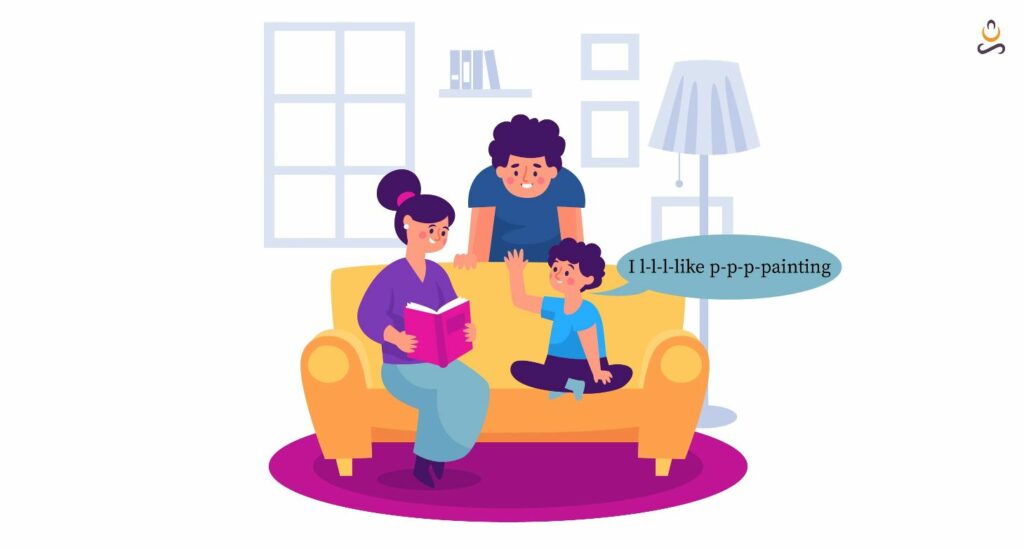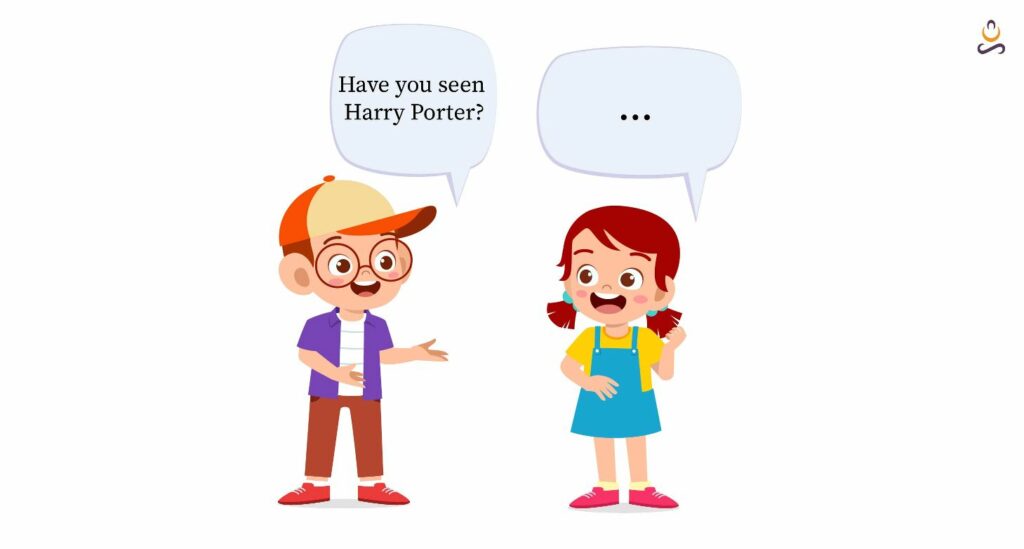None of us think along the same lines, walk or move similarly. How can we expect everyone to talk in the same way?
Every child goes through a period of normal disfluency. More than 8% of children will experience stuttering or stammering.
Speech disfluency is usual between the ages of 2 and 5 years.
Is It Normal For School-Aged Children To Stutter?
Stuttering in children between the ages of 2 and 5 years may begin all of a sudden.
According to speech-language pathologists (SLPs) like Charles van Riper and Barry Guitar, the period when children begin stuttering coincides with their rapid language learning phase.
During this period children learn new words and begin to use bigger words to express themselves.

Around 75% of children who stutter at this age will recover and speak fluently. Many will recover without therapy.
However, there are times when a child may require speech therapy to regain fluency or find the confidence to speak with reduced frequency and intensity of stuttering.
When Should You Seek Help A School-Aged Stuttering Kid?
How can you tell when it’s time to take your child to a speech therapist or a speech-language pathologist?
The symptoms of stuttering vary across children. If your child is still stuttering after 5-years of age or their symptoms are getting worse, you should consider talking to a SLP or speech therapist.
You should consult a specialist if your child –
- Tries to avoid talking in social situations
- Repeats whole words and/or phrases frequently
- Repeats syllables and sounds frequently
- Begins a word but changes it in the anticipation of stuttering
- Shows facial and/or body movements in an effort to speak
- Has sounds that show strain
- Has vocal tension and a rise in pitch/loudness while speaking
Every child’s stuttering behavior is different.
If your child is showing one or more of these signs it may be time to consult a SLP.
What Does Speech Therapy For School-Aged Children Cover?
When children approach school-age, speech disfluency becomes more complicated as they begin to experience anxiety, shame, and the fear of speaking.
The person may develop secondary behaviors to hide stuttering.

Therapy-based stuttering treatment for school-aged children, including adolescents, encompasses several goals such as
- Attempting to accept stuttering
- Reducing avoidance behaviors
- Reducing secondary behaviors
- Increasing fluency
- Enhancing communication skills
- Managing bullying
- Improving self-confidence
- Minimizing the effects of stuttering on the kid’s life.
According to a study by Yaruss et al, as the child experiences more difficulty in communicating, s/he may experience shame and an aversion towards communication.
Apart from teaching fluency techniques, clinicians need to focus on desensitization techniques that will help reduce bullying.
SLPs also need to educate the child’s parents and peers about stuttering and the effects it has on the individual.
What Can A Stuttering Kid Gain From Speech Therapy?
For the older school-aged children, the results of speech therapy will vary. Some will become fluent after weeks or months of therapy.
Other children might find the confidence to stutter while talking.
Here’s what a parent or the CWS can expect from therapy –
1. Making Changes in Speech
The speech therapist will teach a few techniques, such as pull out, diaphragmatic breathing, easy onsets, sing-to-start, and light articulatory contact.
These techniques will help children stammer with less tension. CWS can learn to speak in a relaxed way.
2. Understanding Stuttering
A child will gain an understanding of speaking and stuttering. Gain a better knowledge of how vocal cords and articulators work.
Children may be able to put the new techniques to work when they anticipate a stutter.
3. Reduce Avoidance Behavior
Children are more afraid of the reaction of the listeners than their stutter.
Your child will receive complete guidance and encouragement while trying their feared words. They may get to explore new situations.
Overall, CWS can benefit massively from speech therapy by reducing their avoidance behavior.
4. Acquire Good Communication Skills
Good communication skills are indispensable in every walk of life.
Your child will learn that communication doesn’t depend on fluency.
An experienced speech therapist should be able to explain how listening, taking turns to speak, and holding eye-contact can contribute to communication skills.
A CWS will benefit from learning how to take control of a conversation.
5. Taking About the Emotions of Stuttering
Stuttering is not just about speech disfluency. It often attracts bullying, condescension, discrimination, and derogatory remarks.
School-aged children are highly impressionable and vulnerable. They should have someone to talk to about their emotions regarding stuttering.
A therapist, with the help of a cognitive-behavioral therapist (CBT), can help them navigate their emotions.
Unhelpful thoughts and negative attitudes are almost unavoidable. However, a therapist can guide a CWS to cope and be optimistic.
How Can Parents Help Children Who Stutter?
You, as a parent, play a critical role in stuttering therapy for your child.
You can try the following steps to ease your child’s speaking.
They can become more confident and relaxed in their speech once you begin imposing these changes –
- Avoid correcting them. Don’t criticize CWS when they stutter.
- Don’t ask your child to “slow down” or “breathe” while they are struggling to speak.
- Speak slowly and clearly.
- Ask fewer questions.
- Hold regular and informal family conversations, such as over dinner.
- Don’t ask your child to articulate at all times.
- Make talking fun and not a chore.
- Maintain eye contact while addressing your child.
- Maintain a calm atmosphere at home.
- Let your child speak for themselves. Don’t finish their sentences, even when they are conversing with someone else.
Learn more about stuttering. Inspire your child by providing them examples of successful people who stutter in real life.
How Can Parents Make Speech Therapy More Successful for Stuttering Kids?
You can make a great deal of difference in how your child perceives stuttering. Almost every experienced speech therapist involves the parents of CWS.
Changes in how the entire family communicates can help the child with their fluency. The therapist may even assign “homework” to each member of the family.
The parents should help their CWS during this “homework.”
It is typically in the form of including techniques in informal communication. It can be in the form of games.
Your child’s therapist may also contact their school with permission. They can speak with the teachers to ensure that your child gets the necessary support in class.
Therapy doesn’t promise to cure stuttering for school-aged kids. Some children do gain fluent speech that they retain for the majority of their life. However, stuttering therapy aims to give the child confidence to communicate in their unique way. Therapy also aims to eliminate the shame that often comes with stuttering in school-aged children.










